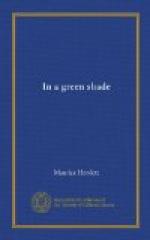In the Middle Ages a great and ever-present fear of death coincided with an extraordinary neglect of life. Whole companies, whole classes of men thought of little but death; yet they killed each other for a look or a thought; in war whole cities were put to the sword and fire, as the Black Prince put Limoges. Timor mortis conturbat me! So men shuddered and wailed, but took not the smallest trouble to keep each other alive. The Black Death swept off at least a third of the population of Europe; yet after it things went on exactly as before. If nations had then possessed the technical skill which they have to-day, it is quite on the cards that France in the Hundred Years or Germany in the Thirty Years War, would have been emptied of its folk. The will thereto was not wanting, that’s certain.
Well, we are a little better than that. Sanitation has at last become a fixed idea. And there is another thing. We no longer consider a man as magnified by his office, but rather that the office is magnified in that a man is serving it. In the old days the splendour of an army on the march was reflected upon the men composing it, and glorified every one of them. Now it is the other way. We are apt to see the army glorious because it is composed of men. Lord Kitchener’s host, perhaps, has taught us that. We are getting on, then, if we are beginning to take manhood seriously.
It is something at least, and so much to the good, that we have imagined a new sacrament, and found it in the attitude, if not in the act of thought. “Who rises from his prayer a better man, his prayer is answered,” said a wise man; and if that is true, the King may save his people yet. But to enable him to do it we must pray for the living rather than the dead, and pray for Good Will among them. For that is what we want.
THE QUAKER EIRENICON
In our late scramble to spend our own, or secure some other body’s, money, a message of beauty, distinction and serene confidence in its own truth, has been overlooked by this distracted world. There is little wonder. As well might a blackbird flute on Margate Sands on a Bank Holiday as this Quaker message, “To all men,” breathe love and goodwill among them just now. The effect has been much the same: to those who heeded it matter for tears that such heavenly balm should be within our hearing but out of our grasp; to the ravenous and the rabid a mere foolishness.
To my mind nothing so admirable has been put forward by any Church calling itself Christian throughout five years’ horror and delirium. I must not expect the Morning Boast or Long Bow to agree with it, but I am inclined to ask my fellow citizens if they have not yet had enough of these evangelists of war and ill-will towards men. If they have, here is an alternative for them to try.




